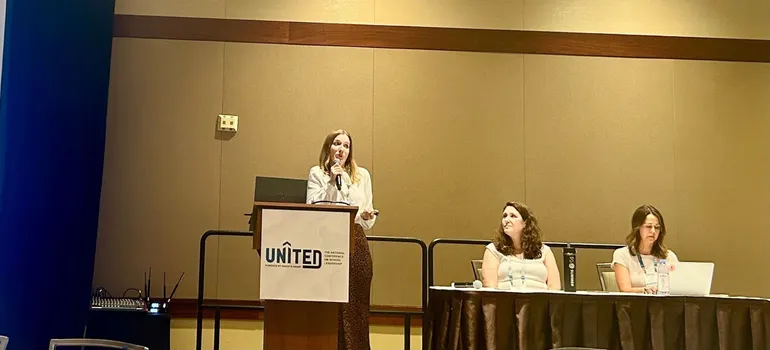This blog was kindly authored by Dr Emily Magrath, Director of Programme Development and Impact at IntoUniversity.
After fielding a flurry of questions from the classroom of 7 and 8 year olds – ‘what is my favourite colour?’, ‘Is this a university?’, ‘Do staff sleep in the building at night?’ – we settle together to explore the question: ‘what is a career?’ Today, this looks like high-vis jackets and hard hats for civil engineers to plan the needed infrastructure for a town; paleontologists codifying discovered fossils; and foley artists creating a soundscape for a forest epic. The students identify the skills they have used and tell me their many ambitions – the room includes possible footballers, doctors, engineers, nurses, lawyers, fashion designers, a taxi driver (like his dad) and a mathematician. This is a starting point, one which gives them years to think about their future possibilities and, more importantly, to build the knowledge and skills to make them future realities.
The potential for talent is everywhere
Geography has become a primary driver of inequality in the UK. Despite initiatives to widen access to university and despite increases in higher education progression rates, areas remain where progression rates and education outcomes remain persistently and stubbornly low. As recently articulated by Alan Francis OBE, Chair of the Social Mobility Commission, this continues to ‘waste talent and limit potential’ across the UK.
Mounting evidence is stark in emphasising the particular challenges of these areas, so-called cold spots, which are, in reality, places systematically starved of opportunity with intersecting barriers: geographical isolation; lack of or expensive transport options; lack of teacher quality; and a lack of graduate jobs. Young people from disadvantaged backgrounds who want to pursue higher education in these locations face hard choices, often commuting to university, struggling to pursue their chosen career in their local area or having to leave it behind. It is not a surprise then to see the UPP Foundation’s inquiry on Higher Education attitudes in Doncaster this year determining that for many young people university is seen as a “bad bet.”
In the face of these challenging intersections, starting widening participation work at 16 or 17, (or even 14 or 15) is too late. Interventions beginning at these points ultimately have failed many students in these regions – approaches must be anchored from primary age.
Why start at primary age?
It is clear that students from disadvantaged backgrounds face additional educational barriers. Their starting point often shows significant gaps to more advantaged peers, and without intervention, these can become entrenched well before secondary school. In 2023, the Education Policy Institute estimated the disadvantage learning gap at age 5 to be 4.6 months. This was wider than it had been prior to the pandemic. Furthermore, in some areas of deprivation, 50% of young people begin school with delayed language development.
There are no easy solutions, but earlier intervention is essential for building learning progress, fostering positive educational experiences and supporting students to acquire necessary qualifications for progression to higher education.
I would like to study accounting. I want to be rich and I love maths. I would like to study at Oxford university because it’s one of the best universities
Year 6 student, IntoUniversity
Alongside academic development, the implicit and explicit messaging young people hear is key. Young people are full of aspirations, but they need to hear not only how to connect these to actual pathways, but also that they can achieve them. Otherwise, their beliefs can become fixed – often in early teenage years – that university is not for ‘people like them’.
An antidote to this is to start conversations early and normalise university spaces. I have seen powerful examples of how sustained work can make a difference: a widening participation officer telling 10 and 11 year olds that the local university was “their university,’ they were welcome to ask questions and find out what happened there; seeing toddlers at ease climbing over benches in a lecture theatre at a family learning day; and the 18 year old who told me they just assumed they would go to the city’s university because ‘you took me there every year since I was little’.
Building place based ecosystems
Just after the pandemic, I met a father photographing his son in a graduation gown and mortar board at one of our primary graduation trips to a university – the culmination of a programme where students have imagined a university future for themselves. He proudly showed me photos of his older children in previous years (fortuitously aged so that none had missed out during the pandemic). This engagement with the university was a touchstone for each child and for the family.
The children go through the programme in Year 4, 5 and 6, and so they know it’s coming, and their siblings know it’s coming. They have an aspiration, and they know about what’s next. It’s a clear message for our school. Education is a journey, it continues in Secondary school and beyond and opens up opportunities. Because it is built into our curriculum, university feels like an entitlement for them. It is available for them.
Primary School Headteacher about IntoUniversity primary school programme
The recent Ruskin Institute for Social Equality’s report on coastal cold spots this year similarly emphasised geography’s critical role in higher education access. It showed that, accounting for similar backgrounds, young people can experience as much as a fivefold difference in their likelihood of progressing to HE based on where they live. The report argued that a move away from ‘collaborative, place-based, cross-sector approach’ to one emphasising individual universities’ targets has not served these areas well.
Consistent, long-term, sustained work from an early age is the only path forward when countering the entrenched challenges of cold spot areas. These are not challenges that can be solved by one intervention, one school, one charity or one university. Young people in these places need ecosystems of sustained support and opportunities available from an early age. That is how we can shift the dial on persistently low progression rates and ensure equitable access to higher education for all young people, regardless of where they live.










